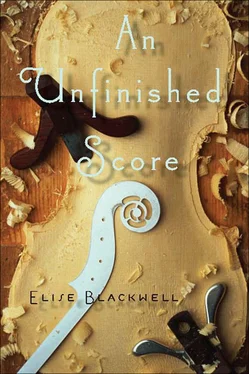She peers back into her closet, wondering what a person is supposed to wear at a composers’ institute. She grabs jeans, shirts, and black dress and drops them on the bed next to the suitcase. “You’ll work while I’m gone?”
“Of course,” he says. “It’s what I do.”
The composers are housed in a large hotel. They are six, if Suzanne counts herself and Alex as one. She feels dwarfed by the huge lobby but even more so by the other aspirants. One of the young men wears a Hawaiian shirt and an eagerness for friendship, but most are reserved. Two — one man and one woman — seem frankly hostile. Suzanne remembers the competitiveness from Curtis and from her summer at Marlboro, but it was friendlier there. Even Anthony knocked off with only a comment or two, not actually wanting others to fail but only himself to succeed.
Or maybe it only seemed friendlier, given her naïveté and the more youthful stakes. Maybe she just didn’t know enough to feel threatened or to wield her own knife. Occasionally Ben was accused of a cutthroat attitude, but she understood immediately that this was a misreading. There was a confidence there, verging on arrogance, and a disdain for laziness and shortcuts of any kind. And aloofness always. But no malice. He could be fairly accused of ignoring other people, of failing to notice them, of frowning openly at their musical tastes, but not of wishing anyone else failure or harm. Even before she knew much about him, she could feel that there was no aggression. He never schemed. And even now, when she has learned that so much about him is not what she thought, she knows she was right about that. He is not a mean person.
What she does know now that she didn’t know when she was a student is that some people are indeed mean, with no compassion. Perhaps they are the least dangerous of all people, the least likely to hurt you, because you know they would if they could. That’s what she thinks when she meets Lisa-Natasha and Eric. Though she doesn’t think they are a romantic pair, and maybe not even allies, they are sticking together for now, and Suzanne thinks of them as joined, as male and female halves of the same taut ambition. They even look alike in their dark skinny jeans, black shirts, and streaky hair, with their fast-moving eyes, with their speedy assessments and dismissals of the people they introduce themselves to, never shaking hands or asking much.
“Not Lisa. Not Natasha. Lisa-Natasha,” the female one says, and Suzanne whispers, “Got it.”
But other composers’ attitudes aren’t at issue, not really. Suzanne is not here to make friends, if she could even remember how to go about it or figure out whom to trust. She is here to finish whatever it is that Olivia started. She has come for the learning and the work. Perhaps she is here to become, at last, a composer. Mostly, though, she has come to Minneapolis to have the concerto worked on and performed. She has come to hear what it sounds like and to have her farewell from Alex.
Her relationship with Alex was an education in how to compartmentalize her emotions, her thoughts, parts of herself. Even so, she is surprised at how easily she sets aside Ben and Petra. For the first time she understands Ben’s ability to work in the days after she lost the baby. She wasn’t able to play, not even a little, for several weeks, and his capacity to overlook her pain and write music made him seem monstrous and her feel weak. And to overlook his own pain , she realizes for the first time. Now maybe she sees: he wasn’t ready to think about it, and he knew it wasn’t going away. Why not work?
She studies her itinerary in her large room, and for a moment she feels as though Alex is in the bathroom or has run down to the lobby for aspirin or a newspaper — as though he will be right back. No, she reminds herself sternly, but then she thinks, He is here in the music . There is comfort in this thinking, but it’s not mere comfort. She believes it.
The itinerary names the work: Viola Concerto, composed by Alexander Elling and Suzanne Sullivan. They are united on the page even if they are divided by life. Her hands shake, and she lowers the paper to the bed to read the five-day schedule of meetings, panels, critique sessions, lectures, readings, rehearsals, and, finally, the Friday-night public performance of the six works.
It is late when she turns her lights off, and she sleeps the deep sleep available to her only when she is both alone and very tired. If she dreams, she does not remember her dreams, and so upon waking she thinks instead of the Chicago dream of being trapped inside the moist head of another person, attempting an escape that may be futile. She comforts herself again, telling herself that it is Alex’s head she has been inside, inside his music and his mind, and so no escape is necessary. She feels oddly confident about the concerto itself: she has solved it, and the result is both daring and beautiful.
Showered and dressed, Suzanne finds her way to the continental breakfast set out in one of the hotel’s conference rooms. As she serves herself coffee, weak orange juice, and an oblong wheat roll, she greets the other five composers. Again Lisa-Natasha and Eric respond icily, turning their heads slightly away as they speak to her and saying something mildly clever. She wants to assure them that she is no threat at all. The friendliest of the bunch wears another Hawaiian shirt, this one even brighter than yesterday’s. “Bruce,” he says, shaking left hands with her as his right balances a plate holding his breakfast and a steaming mug.
“I know,” she says. “I’ve had the pleasure of seeing you play.”
She overhears Lisa-Natasha say to Eric, “It’s easy for him not to care. He’s already concertmaster in Baltimore. This is a second career for him, and he doesn’t need to succeed. That one, yes, her, she’s also a performer.” Suzanne smiles at Lisa-Natasha, almost impressed that she didn’t whisper.
She also exchanges names with a slightly ghoulish-looking young man with a British accent — Paul — and a haler, tall guy who introduces himself as Greg. She has read the short biographies provided by each, but Greg Michael Simon is someone she has heard of before. She cannot remember if Ben mentioned him with admiration or disdain; she will know for sure when she hears his composition, which the program bills simply as a short symphony for small orchestra.
Given the unusual provenance of the concerto—“the tragic circumstances of its collaborative nature” is how Olivia phrased it — special permission has been granted for Olivia to shadow Suzanne.
Making the emotional literal . Olivia is at her side by the time she sits to eat. In black pants and a tee-shirt-styled sweater, Olivia looks slightly more casual than she did in Chicago, though she is as collected as ever with her hair smoothed back and her earlobes dotted with silver knots. The sweater that looks easy on first glance is, on a closer look, make of good thin wool.
The composers sip their beverages and eat their breakfasts at the large round table, and soon a second table fills with the week’s instructors and lead musicians, some of whom nod to them and some of whom ignore them altogether and instead catch up with each other. The conductor stands at a lectern and taps the microphone. He holds himself tall and speaks with confidence, as did Alex, as do most conductors, who have sought front and center and are accustomed to being watched. He’s younger, though, and takes up more space. Alex was already trim when Suzanne met him, and his response to aging was to lose more weight, not realizing that it made him seem not younger but rather a tad more frail — something she never told him.
Читать дальше












